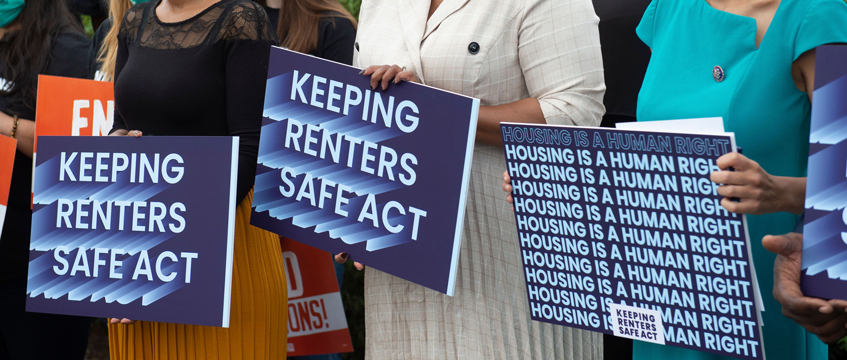Leading figures in the BTR sector have warned that rent controls will stymie growth, as concerns build over whether the government will follow the US and Scotland in introducing caps.
Proposals in Scotland to introduce rent controls are already thwarting investment, according to BTR experts. Polly Simpson, director and head of multifamily development at Savills, said no deals have closed in Scotland since its government announced that the rent cap will be set at 0% until at least 31 March 2023.
Speaking at the UKAA’s BTR and Beyond event on 15 November, Simpson said if rental growth controls are to be implemented in England, “there are probably lessons to learn [on] how not to [from] Scotland”.
Thomas Grounds, head of research at Grainger, said he is not supportive of rental regulation as it could lead to a significant supply shortage.
Grounds said: “The reality is [if] rent control that set rents below CPI wages, whatever metric you care to use, if that kind of thing comes in, what happens? Supply goes down or supply does not come through at the rate we need it to come through.”
Michael Harrington, director of operations at Related Argent, who recently relocated from New York, agreed that rent control will exacerbate ongoing issues with supply that the BTR market is “already struggling” with. “As rent regulation comes into place, supply will drop even more, and it creates an even more challenging time,” he said.
Lessons from the US
Jesse Miller, managing director of Hawaii-based brokerage Kokua Realty, cautioned that rent control may not be the solution that some believe it to be. He cited his experience working in Oregon in 2019, the first US state to pass state-wide rent control.
After rent controls were introduced in Oregon, the city’s development pipeline shrank and properties became less affordable as supply decreased, according to Miller.
“For the record, I’m not anti-rent control,” he said. “I don’t want my grandma to get 10% rent increases every year. But at the same time, people have to understand the unintended consequences that occur when you roll this stuff out.”
Miller said that policymakers will often push through proposals that lead to a “short-term gain” but a “long-term loss”.
“It is an easy thing for policymakers just to roll out, [but] the consequences to the industry in terms of development could be disastrous depending on how severe and restrictive [rent control] is,” he said.
Other options
In place of rent control, Miller believes alternative measures that have successfully worked are tax abatement programmes, zoning restructures and building density changes.
Miller highlighted that there were “a lot more similarities than not” between the US and UK residential markets. “Hearing about the problems that operators, owners and investors are grappling with are very similar to the problems we have [in the US],” he said.
However, Miller called on the UKAA to look more proactively at other courses of action to boost affordable housing, comparing the organisation with the National Apartments Association, a US rental housing trade body.
Miller said: “At the end of the day, the UKAA should look at what’s worked out because we have got a legislative committee with the National Apartments Association and [it says], ‘Here’s all the stuff that has been done to develop affordable housing’. That could be something that can be looked at alternatively to ‘Let’s just do rent control’.”
See also: US and Nordic investors to swoop on UK BTR
To send feedback, e-mail akanksha.soni@eg.co.uk or tweet @EGPropertyNews











